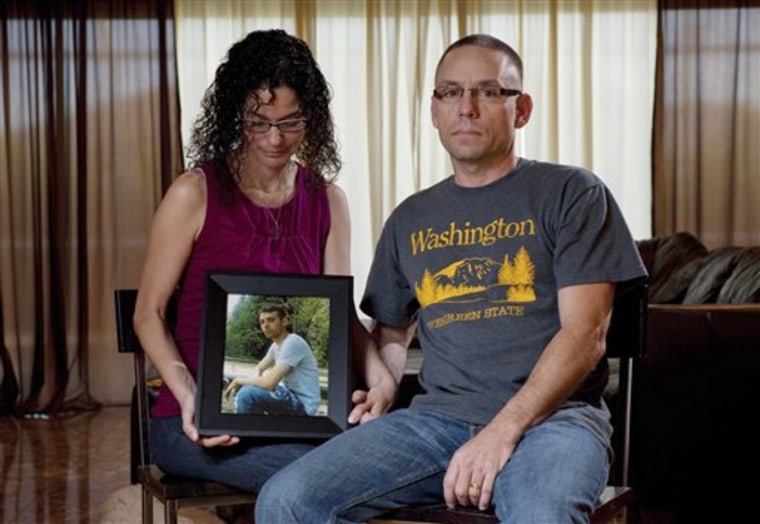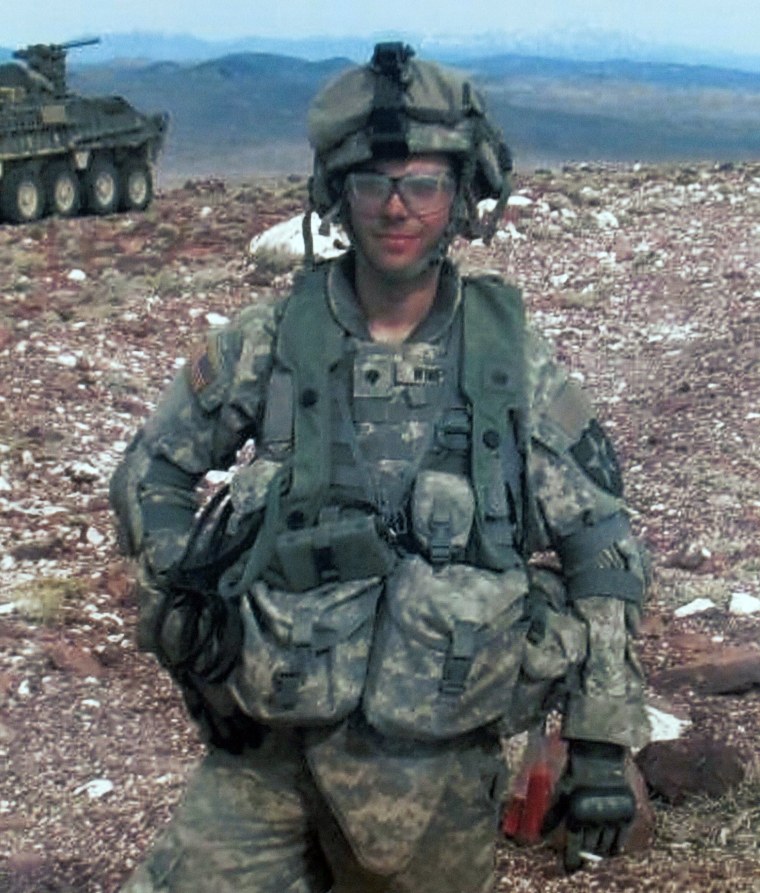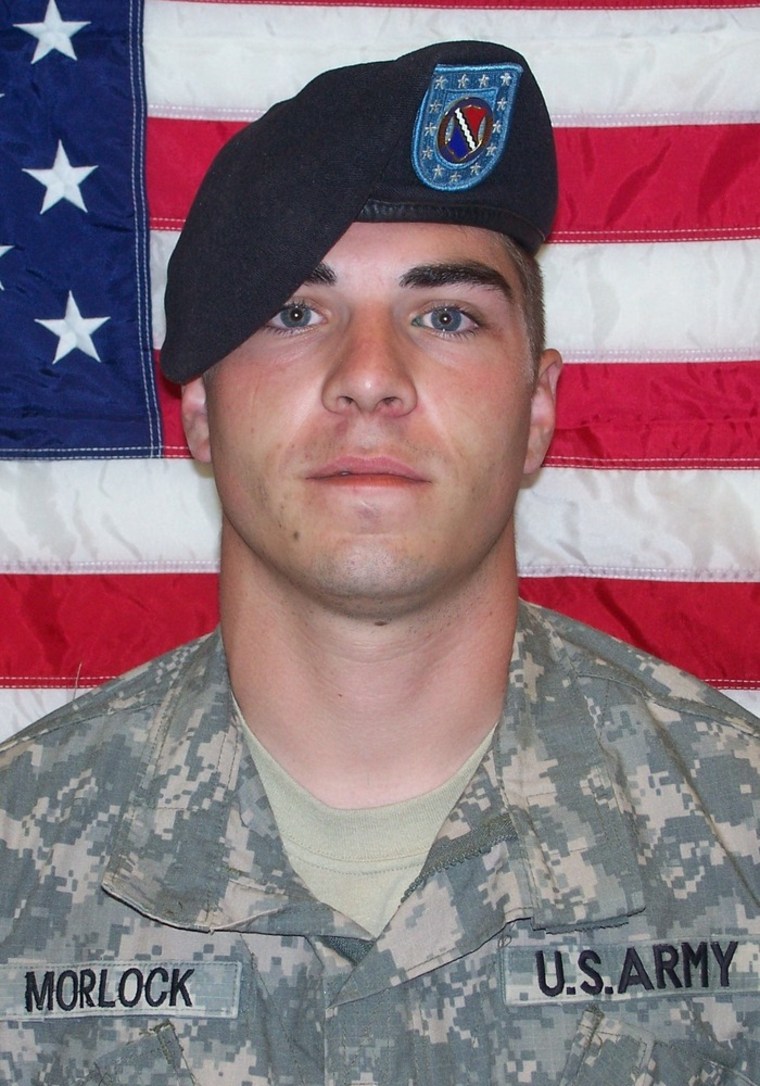A soldier's videotaped statements describing how he and his colleagues randomly killed three Afghan civilians came under scrutiny Monday at a hearing into one of the most serious war-crimes cases from the war in Afghanistan.
Cpl. Jeremy Morlock of Wasilla, Alaska, is among five Stryker soldiers charged with premeditated murder and conspiracy to commit premeditated murder. In interviews with Army investigators, he described a plot led by Staff Sgt. Calvin Gibbs to randomly kill civilians for sport while on patrol in Kandahar Province.
Prosecutors have also alleged that members of the platoon mutilated Afghan corpses and even collected fingers and other body parts, and that some posed for photos with Afghan corpses. Morlock talked about how they threw a grenade at a civilian to "wax him."
Morlock's attorneys are seeking to suppress the statements, saying they were made under the influence of muscle relaxants, sleeping pills and anti-nausea medicine prescribed for repeat concussions suffered during war. Morlock was being evacuated from Afghanistan for apparent traumatic brain injury when he was questioned in May.
They also blasted Army doctors and U.S. policy in a news conference, saying they didn't understand how a cornucopia of drugs could possibly render a brain-damaged soldier battle-ready. Morlock sustained his first concussion from a roadside bomb last November, and that's when the first drugs were prescribed, they said.
"This lad was all juiced up and it was by Army doctors," said attorney Geoffrey Nathan. "Why didn't they just recall him?"
Army Special Agent Anderson D. Wagner testified that Morlock was articulate during the interviews and that his account was corroborated by others in the unit. The hearing will determine whether the case proceeds to a court martial; Morlock and the others could face the death penalty if convicted.
"He made good eye contact. He was able to recount events that happened several months ago," Wagner said by audio feed from Kandahar.
Prosecutors listed 18 witnesses for Monday's hearing. Fourteen of them asserted their right to remain silent, including other defendants and 1st Lt. Roman G. Ligsay, who has been removed as leader of the platoon but is not charged.
Morlock's lawyers conceded they don't know specifically what drugs Morlock was taking at the time of the killings. Hashish smoking was rampant in the unit, and in some cases it may have been laced with opium, they said. The silence of other witnesses makes it hard for them to verify what drugs, prescribed or not, Morlock might have been on at the time of the killings, they said.
Portions of Morlock's interviews were aired by ABC News, and The Associated Press has reviewed statements he made under oath in which he claimed Gibbs — the highest ranking soldier accused — planned "scenarios" during which they could kill civilians. For example, Morlock said, if they came across someone in a village that had previously been flagged as having Taliban influence, they could toss a grenade at the civilian and claim they had been responding to a threat.
Gibbs also illicitly collected "drop weapons" that could be placed by the bodies to make them appear to be combatants, Morlock and others said.
"Gibbs had pure hatred for all Afghanis and constantly referred to them as savages," Morlock said in the statement reviewed by the AP. "Sometime after Christmas 2009, Gibbs gave me a (fragmentary) grenade and told me that if the situation presented itself that we should go ahead and run with the grenade scenario that he had briefed to us."
A few weeks later, in January, the first of the killings was carried out, followed by one in February and one in early May. In each, prosecutors say, Morlock and Gibbs enlisted one other soldier to be involved. Lawyers for those three say they either deny involvement or that their participation was unwitting.
Gibbs' attorney says all three killings were "appropriate engagements."
Worse than Abu Ghraib?
The case of Morlock and his co-defendants could become the grimmest investigation of alleged atrocities by U.S. military personnel during almost nine years of war in Afghanistan.
Reports of grisly photos of Afghan bodies being posed for photos by American troops could be among the more inflammatory revelations to emerge from the case, echoing worldwide outrage stirred by pictures of nude Iraqi prisoners of war taken by U.S. military personnel at the Abu Ghraib prison in Iraq.
The photos referred to in the charging documents "have not been released ... as yet to the public," Army spokeswoman Maj. Kathleen Turner said Sunday.
The case raised serious questions about the Army's handling of the case. Spc. Adam Winfield, who is charged in the final killing, sent troubled Facebook messages home to his parents in Florida after the first killing. He wrote that he was being threatened to keep his mouth shut about it and that he didn't know what to do.
His father made nearly half a dozen calls to military officials that day, and he said he warned them about the ongoing plot and the threats against his son.
But no suspects were arrested until May, when a witness in a drug case in the unit alerted investigators to what he considered unjustified killings.
Morlock was the first of five soldiers initially charged in June with the murders. Seven others have been charged since then with various other crimes stemming from the investigation, including conspiracy to cover up the slayings.
Four of the soldiers have been charged with keeping body parts, including finger bones, a skull, leg bones and a human tooth.
The hearing at Joint Base Lewis-McChord near Tacoma, Wash., is expected to last a day, with the investigating officer taking up to several weeks to decide whether a court-martial is warranted, Turner said.
Morlock has a history of criminal charges, the Tacoma News Tribune reported Monday: his wife sought a domestic-violence protective order against him two years ago; he was charged with assault and disorderly conduct against his wife and found guilty of the latter charge last year; when he was 15, he was charged with leaving an accident involving an injury or death and received a deferred prosecution.
Dad says son tried to alert Army
Christopher Winfield, who was shocked when his son Adam was among those charged, said his son did not kill the unarmed man and would never have been in the situation if the Army had investigated the warnings he says he passed along to Fort Lewis.
An Army spokeswoman at the base said she could not comment on whether they received such a tip or if so, whether it was acted on.

Pentagon press secretary Geoff Morrell said he had no information about the man's claim. "That's disheartening to hear if that is indeed the case," he said. "If someone is trying to reach out, trying to notify us, trying to head off a potential problem, that's something we need to pay attention to and heed that warning."
The new details about Winfield's efforts to alert the Army and his son's pleas raised questions about the Army's handling of the case and its system for allowing soldiers to report misconduct by their colleagues.
Winfield is charged with murder in the final killing, and his attorney, Eric Montalvo, insists he was ordered to shoot after Gibbs hit the civilian with a grenade. Winfield deliberately shot high and missed, he said.
Gibbs has denied the charges. His attorney, Phillip Stackhouse, said his client maintains that the shootings were "appropriate engagements" and denies involvement in any conspiracy to kill civilians.
The AP reviewed witness and defendant statements as well as documents filed with an Army magistrate for this report.
Gibbs, 25, of Billings, Mont., arrived in the unit late last year and soon began discussing how easy it would be to kill civilians, some in the platoon told Army investigators. He and Morlock, 22, planned "scenarios" in which they could carry out such killings, they said.
Morlock gave investigators extensive statements describing the plot.
Morlock's lawyer told The Seattle Times that the statements were made under the influence of prescription drugs to treat traumatic brain injuries from explosions and should be suppressed as evidence.
In each of the killings, Morlock said, he and Gibbs planned and initiated the attack and enlisted one other soldier to participate.
A father looks back
The first indication for Christopher Winfield and his wife, Emma, that something was amiss came Jan. 15, the day of the first killing.
"I'm not sure what to do about something that happened out here but I need to be secretive about this," their son wrote them in a Facebook message. The couple gave the AP copies of the Facebook messages, Internet chats and their phone records.
Winfield, 22, of Cape Coral, Fla., didn't immediately provide more details, and over the next month he had little contact with his parents. They said they checked constantly to see if he was online.
On Feb. 14, he told his parents what happened in a lengthy Internet chat: Members of his unit on patrol had killed "some innocent guy about my age just farming." He said he did not witness the killing.
But, he wrote, those involved told him about it and urged him to "get one of my own."
He said that virtually everyone in the platoon was aware of what was going on, but no one seemed to object.
"If you talk to anyone on my behalf, I have proof that they are planning another one in the form of an AK-47 they want to drop on a guy."
He added that he didn't know whom to trust and feared for his safety if his comrades learned he was talking to authorities.
'No more good men left here'
"Should I do the right thing and put myself in danger for it. Or just shut up and deal with it," he wrote his parents. "There are no more good men left here. It eats away at my conscience everyday."

In statements to investigators, at least three platoon members said Gibbs directly threatened Winfield. Morlock added that Gibbs devised "scenarios" for Winfield's death, one of which involved Gibbs dropping heavy weights on him as he was working out.
Gibbs accosted Winfield as he was on his way to speak with a chaplain and warned him to keep quiet, Montalvo said.
Soldiers serving in a combat theater typically would report crimes up the chain of command, to military investigators or chaplains, to members of the Defense Department inspector general's office, or even to another unit if their own commanders are involved.
One soldier, Pfc. Justin A. Stoner, who reported hashish smoking in the unit, said he was beaten by several platoon members. Gibbs and Morlock then paid him a visit, with Gibbs rolling out on the floor a set of severed fingers, he told investigators.
Morlock told him that "if I don't want to end up like that guy ... shut the hell up."
Winfield asked his parents to call an Army hot line because he didn't want anyone to overhear him using the phone.
Dad: I called Pentagon hot line
His father, a Marine veteran, was shocked, and made five calls to military officials that day, his phone records show.
He said he left a message on a Defense Department hot line and called fou
r numbers at Fort Lewis. He said he spoke with an on-duty sergeant and left a message at an Army Criminal Investigations Division office before reaching the base's command center.
In that call, an official told him that if his son wasn't willing to come forward while deployed, there was nothing the base could do, Winfield recalled in interviews with the AP and in a sworn statement to Army investigators.
The official suggested the soldier keep his head down until his deployment ended and investigators could look into his claims, he said.
The elder Winfield told AP he regrets not writing down the identities of those he spoke with. He said he did not give any of them Gibbs' name, but did identify his son. He said one of his son's sergeants had been involved in a civilian's murder and was planning more.
His son soon expressed concern about what would happen if Army officials stateside began making inquiries and asked his dad to back off. The elder Winfield said he complied.
A week later, the second killing occurred. On May 2, the third killing took place.
The killings eventually came to light when the soldier who had reported the drug use told investigators that Morlock "had three prior kills that none of which I believe were actually justified."
